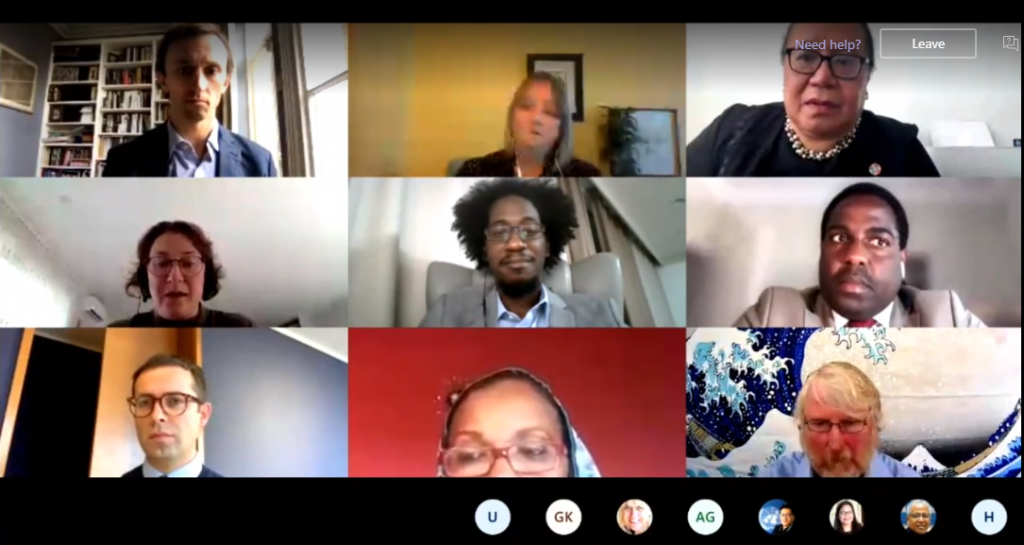On the 9th of June 2020 a special event on “Advancing NAPs and climate-resilient recovery under COVID-19” was organized by the UNFCCC as part of its June Momentum Climate Change initiative. The event featured as high level included the SBI Chair, the Under-Secretary-General High Representative for the Least Developed Countries, Landlocked Developing Countries and Small Island Developing States, the chair of the LDC Expert Group (LEG), a representative of the Government of Sierra Leone, a representative from the Green Climate Fund, representatives from UN Disaster Risk Reduction (UNDRR) and Global Water Partnership (GWP) as member organizations of the NAP technical working group, the Chile and UK as present and incoming COP presidencies respectively.
Ms. Marianne Karlsen, Chair of the Subsidiary Body for Implementation emphasized the importance of the event happening as part of the June Momentum as it positions the urgency of adaptation. She reflected on her NAP journey as one of the key negotiators who worked tirelessly on the establishment of NAPs under the UNFCCC process and expressed her pleasure to note that conversations on NAPs is linked to recovery.
Call for accelerated resilience building
One of the designated NAP Champions, High Representative for the Least Developed Countries, Landlocked Developing Countries and Small Island Developing States, Ms. Fekitamoeloa Katoa ‘Utoikamanu, delivered a keynote speech leading the call for resilience building during recovery efforts. She stated as thus:
“Adaptation cannot wait and the time for business, as usual, has long gone. The LDCs and SIDs continue to face fundamental obstacles to fully adapt and given the added complexity of navigating COVID-19 pandemic, accelerated efforts to support countries will require innovating, not simply going back to business as usual.”

Referring to the call for immediate short-term measures of the Group of Least Developed Countries on COVID-19 at the UN General Assembly, the NAP Champion emphasized the need for stimulus packages to include resilience consideration. The global stimulus package for the least developed countries to be funded and implemented with immediate effect includes eight major areas such as a) emergency public health package for the least developed countries; b) support for social protection systems; c) education support for students; d) 0.15 percent of gross national income as ODA to least developed countries; e) full debt cancellation Lifting trade barriers and scaling up aid for trade; f) additional allocations, including increased special drawing right allocations for least developed countries; and g) protection of migrants of least developed countries and promotion of their remittances.
Though COVID-19 has restructured how support to developing countries is delivered, countries have shown unparalleled commitment towards adaptation efforts. Some have found innovative ways of continuing their work while observing regulations put in place by governments. This was aptly pointed out by Mr. Gabriel Kpaka of the Government of Sierra Leone where they continue to advance their NAP, through virtual means, despite the measures put in place by the government against the COVID-19 pandemic. An important consideration to note is that internet connectivity in the LDCs is a major challenge and should not be seen as a magical solution to replace in-country groundwork.
Climate-resilient recovery and NAPs
Responding to the call posed by the USG, Ms. Hana Hamadalla, Chair of the LDC Expert Group, highlighted the main initiatives to advance NAPs together with the GCF and other partners through the NAP Technical Working Group. In particular, the work on the Open NAP initiative and how it catalyzes as many actors as possible to support countries produce their first NAP, building on the vast information that exists on many important aspects of the systems being affected, and likely to be affected, by climate change. It also promotes the notion of providing technical assistance that is vertically integrated where countries can seamlessly conduct vulnerability and risk assessments, advance to prioritize actions in their plans, develop proposals for funding, and also plan implementation in an integrated manner.
Adding to the conversation on support, Mr. Orville Grey of the Green Climate Fund, reported on the status of financial support to developing countries on NAPs and the flexibility extended by GCF in maintaining progress despite COVID-19 crisis. Similarly, Mr. David Stevens of UNDRR emphasizes how countries have stepped up and together with the organizations providing support, have devised innovative solutions, aside from doing work virtually, to ensure achieving impactful outcomes at the end of the year 2020. Mr. Alex Simalabwi of Global Water Partnership highlighted the laudable efforts of the countries in continuing the work despite limited support and underscored the importance of in-country capacity development and ensuring that the process of formulating the NAPs is country-owned and country-driven.
Questions coming from participants online underscored the importance of mirroring resilience in COVID-19 recovery efforts and called upon support delivery organizations to find innovative ways to continue providing support to the most vulnerable countries. While acknowledging the central role of National Adaptation Plans (NAPs) in the recovery process participants highlighted the relevance of using the Open NAP initiative to facilitate the formulation and implementation of NAPs.
Adaptation is urgent and we must do our best to ensure progress is made while countries grapple with COVID-19. Instead of introducing new mechanisms that usually takes years to set up, we need to make use of what we have, which in this case is the NAPs, and work together to make it successful. This resonated with the statements of Mr. Manuel Saldias Kuhlman from the COP 25 Presidency and Mr. Archie Young, from the COP 26 Presidency, as they both emphasized why adaptation is key and how each Presidency are ensuring maintaining the momentum for adaptation as they look ahead to COP 26.
“We regard the NAPs as the crucial instruments to enhance and strengthen the countries’ capacities to identify, assess and prepare for future impacts, which is particularly relevant for developing countries, especially those that are particularly vulnerable to the adverse effects of climate change”- COP 25 Presidency


